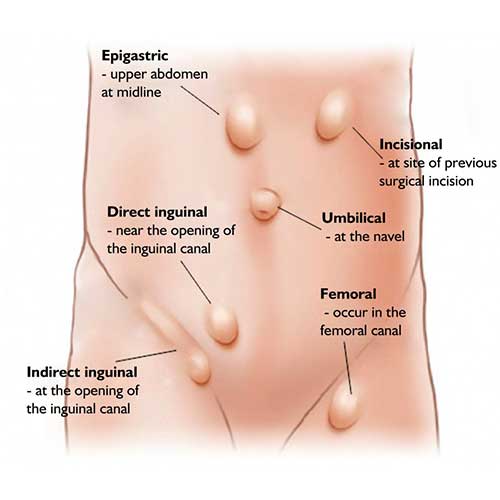Hernia
What is a hernia?
A hernia is when tissues or organs bulge through a weak point in the surrounding muscle or tissue wall.
Many hernias occur in the abdomen (tummy) — the area between your chest and pelvis. If you have an abdominal hernia, tissue from inside your abdomen (such as fatty tissue or part of your bowel) can move into a space where it doesn’t normally sit.
The main symptom of many hernias is a bulge that you notice more when:
- exercising
- straining
- coughing
- heavy lifting
The bulge may disappear when you lie down.
Types of hernias
There are a number of different types of hernias that can occur in your abdomen:
- inguinal hernias
- femoral hernias
- umbilical hernias
- incisional hernias
- epigastric hernias
- hiatus hernias
Inguinal hernia
An inguinal hernia can cause a bulge in your groin, at the top of your inner thigh.
Inguinal hernias are the most common type of hernia, and mostly affect males. They happen when there is a weakness in the lower wall of your abdomen.
Femoral hernia
A femoral hernia can also cause a bulge in your groin, at the top of your inner thigh. Femoral hernias are more common in females.
Umblical Hernia
An umbilical hernia is when abdominal tissue pushes through a weakness in the abdominal wall near your umbilicus (belly button). It forms a bulge around your belly button.
Umbilical hernias are more common in babies and toddlers.
Incisional hernia
An incisional hernia is when you have a hernia in a place where you previously had abdominal surgery.
Abdominal tissue pushes through the weakness in your abdominal wall where there is scar tissue.
Epigastric hernias
In this type of hernia, tissue pushes through your abdominal wall in the area between your belly button and your breastbone. Epigastric hernias can affect children and usually cause no symptoms.
Hiatus Hernia
A hiatus hernia is when part of your stomach pushes up into your chest cavity.
Your stomach pushes through the opening in your diaphragm where the oesophagus (food pipe) passes through. Your diaphragm is the muscle separating your chest from your abdomen.
What are the symptoms of a hernia?
The symptoms of a hernia depend on the size of the hernia and where it is in your body.
The main symptom of most abdominal hernias is a bulge or soft lump in your groin or abdomen. Usually, the bulge can be gently pushed back, and may disappear when you lie down. Males with an inguinal hernia may notice a bulge in the Scrotum.
You may notice the bulge more when you cough or strain. Umbilical hernias in babies are often more noticeable when they are crying.
You may also have:
- a feeling of heaviness or discomfort around the bulge
- a pulling or dragging sensation where the bulge is
You may notice these symptoms when coughing, straining, exercising or lifting.
What causes a hernia?
Hernias are due to a weakness in your abdominal wall. This weakness may:
- be there from birth
- happen after abdominal surgery
- develop over time
The causes and risk factors for hernias depend on the type of hernia you have.
Hernias are more likely to develop when you have increased pressure in your abdomen. This can be from:
- being overweight or obese
- pregnancy
- having a chronic cough
- constipation and straining on the toilet
Other risk factors for some types of hernias include older age and smoking.
When should I see my doctor?
If you or your child have symptoms or signs of a hernia, see your doctor.
Seek emergency medical treatment if:
- you cannot push your hernia back in
- your hernia becomes sore or firm
- your hernia changes colour to be red purple or dark
- you have sudden abdominal pain that quickly gets worse
- you have nausea, vomiting or bloating
- you have difficulty opening your bowels (pooing) or passing wind
How is a hernia diagnosed?
Your doctor will ask about your symptoms and examine you. Your doctor may ask you to cough, strain or stand while pressing on the hernia.
Hernias can be diagnosed without tests, but your doctor may sometimes recommend tests such as:
- an ultrasound scan
- a CT scan
- an MRI scan
How is a hernia treated?
Treatment for a hernia depends on:
- the type of hernia you have
- the size of your hernia
- your symptoms
- your health in general

